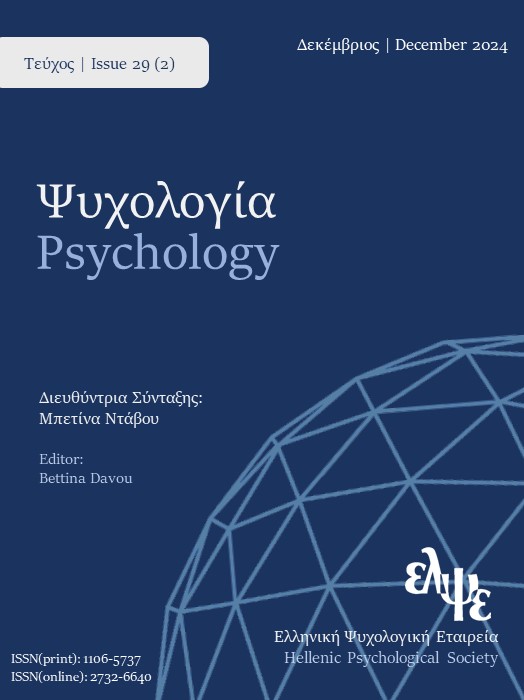Η άποψη των δασκάλων προσχολικής ηλικίας για την προσχολική περιθανάτια αγωγή: Η αντιληπτή αυτοαποτελεσματικότητα, η αντιληπτή επάρκεια και εμπειρίες θανάτου

Περίληψη
Σε αυτό το άρθρο διερευνάται η άποψη των παιδαγωγών προσχολικής ηλικίας σχετικά με την περιθανάτια αγωγή. Συγκεκριμένα, εξετάσαμε τις προσωπικές απόψεις των παιδαγωγών προσχολικής ηλικίας σχετικά με την παροχή περιθανάτιας αγωγής σε σχέση με: α) τα ενδοπροσωπικά χαρακτηριστικά τους, όπως η αντιληπτή αυτοαποτελεσματικότητα και η αντιληπτή επάρκεια για την παροχή αυτού του είδους της αγωγής και β) τις εμπειρίες τους από το θάνατο στο σχολικό περιβάλλον. Το δείγμα αποτέλεσαν 164 εκπαιδευτικοί προσχολικής εκπαίδευσης σε ελληνικά δημόσια σχολεία. Η αντιληπτή αυτοαποτελεσματικότητα βρέθηκε να σχετίζεται με την αντιληπτή επάρκεια των εκπαιδευτικών όσον αφορά την αντιμετώπιση θεμάτων θανάτου. Ωστόσο, δε βρέθηκε σημαντική σχέση μεταξύ της αυτοαποτελεσματικότητας και της πραγματικής αντιμετώπισης του θέματος από τους εκπαιδευτικούς. Οι εμπειρίες θανάτου στο σχολικό περιβάλλον βρέθηκαν να σχετίζονται θετικά με την αντιληπτή επάρκεια των εκπαιδευτικών σχετικά με την παροχή περιθανάτιας αγωγής. Ωστόσο, δε βρέθηκε σημαντική σχέση μεταξύ αυτών των εμπειριών και του επιπέδου διαχείρισης του θέματος. Τα αποτελέσματα δείχνουν ότι οι εκπαιδευτικοί προσχολικής ηλικίας αντιλαμβάνονται την ανάγκη της περιθανάτιας αγωγής. Ωστόσο, αυτό είναι δύσκολο να εξελιχθεί σε πραγματική συμπεριφορά, καθώς δεν υπάρχει η κατάλληλη προετοιμασία. Οι παιδαγωγοί δε χρειάζονται μόνο θεωρητικές γνώσεις αλλά ένα ολιστικό πρόγραμμα προετοιμασίας που θα διασφαλίζει ότι θα είναι σε θέση να σταθούν μπροστά στα παιδιά προσχολικής ηλικίας με επαρκείς γνώσεις, συνεχή κατάρτιση, αυξημένη αυτοαποτελεσματικότητα και αντιληπτή επάρκεια, ώστε να είναι σε θέση να παρέχουν αναπτυξιακώς κατάλληλη εκπαίδευση.
Λεπτομέρειες άρθρου
- Πώς να δημιουργήσετε Αναφορές
-
Μπρουσκέλη Β., & Πιπέρκου Ι.-Κ. (2024). Η άποψη των δασκάλων προσχολικής ηλικίας για την προσχολική περιθανάτια αγωγή: Η αντιληπτή αυτοαποτελεσματικότητα, η αντιληπτή επάρκεια και εμπειρίες θανάτου. Ψυχολογία: το περιοδικό της Ελληνικής Ψυχολογικής Εταιρείας, 29(2), 24–36. https://doi.org/10.12681/psy_hps.36371
- Ενότητα
- ΕΜΠΕΙΡΙΚΕΣ ΕΡΓΑΣΙΕΣ

Αυτή η εργασία είναι αδειοδοτημένη υπό το Creative Commons Attribution-ShareAlike 4.0 International License.
Το περιοδικό ΨΥΧΟΛΟΓΙΑ έχει υιοθετήσει μία πολιτική Platinum open-access. Τα έξοδα υποβολής, επεξεργασίας ή δημοσίευσης των εργασιών καλύπτονται από την Ελληνική Ψυχολογική Εταιρεία. Τα πνευματικά δικαιώματα των δημοσιευμένων εργασιών προστατεύονται από την άδεια 'Creative Commons Attribution-ShareAlike 4.0 International'. Οι Συγγραφείς διατηρούν τα Πνευματικά Δικαιώματα και χορηγούν στο περιοδικό το δικαίωμα της πρώτης δημοσίευσης. Η άδεια αυτή επιτρέπει σε τρίτους, να χρησιμοποιούν την εργασία σε οποιαδήποτε μορφή, με την προϋπόθεση της διατήρησης των διατυπώσεων που προβλέπονται στην άδεια σχετικά με την αναφορά στον αρχικό δημιουργό και την αρχική δημοσίευση στο περιοδικό ΨΥΧΟΛΟΓΙΑ. Επιπλέον, κάθε διανομή της εργασίας οφείλει να γίνεται με τους ίδιους όρους διανομής, δηλαδή με την ίδια άδεια Creative Commons.



